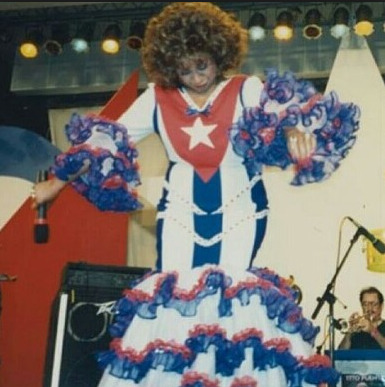Text
Notebook 2
Celia Cruz’s persona is synonymous with Cuba. It is nearly impossible to find discussions about one that don’t also discuss the other. While Fidel Castro barred Celia from ever returning to Cuba, he could never take away the country’s ties to the performer. Celia carried Cuba with her wherever she went, her gift to the world was Cuba. With every “¡AZUCAR!” she reminded the world of her pride and joy.

Celia often handled talks of Cuban politics with grace, usually refusing to talk about the regime, but at the same time denouncing it. Her music did not need to address the political turmoil for it to be the music of the Cuban refugee community. Her music had a way of reducing the politics to something small, while Castro hated her and refused to let her attend her own mother’s funeral, Celia understood that her Cuban fans used her music as a form of escapism. Celia understood what it was like to leave everything behind, her voice is what made her a powerful opponent of Castro.

A year after Castro’s rise to power, while on tour in Mexico, Celia chose not to return to Cuba. She lost her citizenship. The country she was born and raised in, where her family was, the country she loved, no longer claimed her. Despite keeping politics out of her art, Celia’s music became contraband in Cuba, the regime effectively tried to remove her from Cuba’s history. These actions only made her more popular in Cuba and made her ties to her homeland deeper. Despite having citizenship in the United States and not Cuba, Celia Cruz was, and still is, seen as more Cuban than American.

Citizenship as a concept does not bind a culture to a person. While it is used by societies to deny rights to certain people, nothing is predetermined and these constructs are completely made up. While Celia was proud of the opportunities and success she received in the states, she always claimed Cuba as her nation, despite what her citizenship said. Her nation was not just Cuba, she referred to most of Latin America as her home.
Celia’s fame and notoriety can be attributed mostly to her tours throughout Latin America. Celia fought hard to become notable in Argentina, eventually reaching popularity in the country after releasing “La Vida Es Un Carnaval.” As Buzzfeed’s Norberto Briceño eloquently put it, the song teaches “that life sucks and then you die…but at least there’s salsa.” Mexicans idolize Celia because to us she represents a romanticized version of Cuba, one stuck in the 50’s where life was simpler. Cubans, however, see her freedom. She was almost like the Anti-Castro, her music created a sense of nostalgia, a Cuba that felt like home without the fascist regime. Celia’s influence was also international, she played concerts all over Africa, Asia, and Europe. She often mentioned that while her international fans don’t understand her lyrics, her music still gets them up and dancing.
Sources
www.buzzfeed.com/norbertobriceno/latino-songs?utm_term=.uqmx2lNY4#.dyPP4rqLm
http://www.nytimes.com/2003/07/20/us/for-cuban-exiles-the-end-of-an-era.html
http://www.cnn.com/2003/SHOWBIZ/Music/07/16/cruz.column/
http://www.mombu.com/culture/t-celia-cruz-on-how-fidel-castro-denied-her-entrance-to-attend-her-mothers-funeral-9030235.html
http://articles.chicagotribune.com/1997-09-05/entertainment/9709050338_1_celia-cruz-cuban-exile-calle-ocho-festival
https://www.washingtonpost.com/archive/lifestyle/2003/07/17/sugar-and-salsa/f8dbdd2f-bece-44fc-8d30-62c88727bec9/
0 notes
Text
Celia Cruz: La Reina De Salsa
Úrsula Hilaria Celia de la Caridad Cruz Alfonso was born in Havan, Cuba in 1921. While initially going to school to become a teacher and satisfy her father’s wishes she instead switched her area of study and began to pursue a career in music as a performer. At the time singing was considered a disgraceful profession that was only pursued by promiscuous women. For this reason, Celia’s father greatly disapproved of her choice and Celia had to work incredibly hard to make sure her name commanded respect. Celia’s race also provided another obstacle. As a black woman many producers refused to record with her because they believed she didn’t have the ‘look’ of a performer, meaning she wasn’t a conventionally attractive white woman. Despite all this Celia Cruz has become one of the most iconic Latin artists and continues to inspire and influence artists and works even after her death.
While Celia Cruz gained popularity as an artist in 1950’s Latin America, her home country of Cuba was taken by Fidel Castro who implemented a harsh and fascist regime, Her refusal to support Castro’s regime caused her and her band, La Sonora Matancera, to receive a lifetime ban from returning to Cuba. Celia has always been a proud Cubana, her feelings for her homeland can be heard in one of her earlier songs “Cuando Salí de Cuba.” In it she describes that when she left, Cuba she left everything behind with it including her other, her love, and her heart. Despite Celia’s music being banned in Cuba, many Cubans would illegally listen to foreign radio stations just to hear her songs. Despite removing her politics from her music, she still became a symbol of hope for those trapped in the fascist regime as well as the Cuban refugees who fled to other countries. Celia carried Cuba with her to every country she toured to, constantly asking her audience to pray for her homeland and her people.
Celia also carried her African roots within her music, her work was a constant reminder that apart from being Cuban, she was also black and both her identities were an important part of her. Her music utilized Afro-Cuban, and to an extent other Afro-Caribbean, rhythms and influences to generate a unique style. When salsa music was barely beginning she brought African influences into the genre with the song “Quimbara” cementing herself as the queen of salsa. Salsa music would not be what it is today without Celia’s influence and innovation. Arguably the most famous example of this was her use of tumbao, which is literally an Afro-Cuban rhythm played on the bass, but is colloquially used to refer to a type of sexiness and swing. Her song “La Negra Tiene Tumbao” celebrates black women and beauty, the music video even shows a naked black woman enjoying her life and dancing on her own while not caring about the men lusting after her. Celia released that song at 75 years old only two years before her death, which really showed that she tried to spend her life creating joy.

0 notes